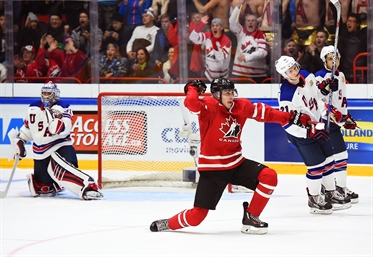Canada on the rebound
Canada on the rebound
Impressive results follow poor showing

 This year's captain, Dylan Strome, hopes to lead Canada to a bounce-back medal after a disappointing finish in 2016. Photo: Matt Zambonin / HHOF-IIHF Images
This year's captain, Dylan Strome, hopes to lead Canada to a bounce-back medal after a disappointing finish in 2016. Photo: Matt Zambonin / HHOF-IIHF Images
But Canada must surely be the favourite as we start the 41st edition of the IIHF’s flagship junior event.
And in a strange way, that’s because Canada had such a poor result last year, finishing a disappointing 6th after being eliminated by Finland, 6-5, in the quarter-finals.
You see, since the first tournament in 1977, Canada has finished 6th or worse only four times previously, and each time Canada advanced to the gold-medal game a year later.
Indeed, after Canada finished 7th in 1981 while being represented by a club team, the Cornwall Royals of the OHL, Hockey Canada met with the three junior leagues—OHL, WHL, QMJHL—and agreed to gather all players from across the nation for 1982, a spirit of cooperation that exists to this day.The result was an undefeated record of six wins and a tie and a gold medal in 1982 in the U.S. under coach Dave King.
In 1987, Canada and the Soviets were disqualified after a brawl in Piestany, Czechoslovakia, during a year in which Canada had an excellent chance for gold. But a year later, under captain Theo Fleury, it came back more determined than ever, winning gold in 1988 right in Moscow.
In 1992, Canada had an outstanding roster that included Eric Lindros, Paul Kariya, Scott Niedermayer, and Darryl Sydor yet managed only two wins in seven games, a lowly 6th-place finish. A year later, with only three returning players (Kariya, Martin Lapointe, Tyler Wright), Canada was nearly unbeatable in winning gold in Gavle, Sweden. It proved to be the first of five straight golds for Canada.
The 1998 team was perhaps the worst in the nation’s history, finishing eighth and losing to Kazakhstan, 6-3, in the placement game for 7th. Fast forward a year later to Winnipeg and Canada advanced to the final game, only to lose to Russia 3-2 in overtime on an Artyom Chubarov goal.
And so here we are in 2017. Canada was dumped unceremoniously last year in Helsinki, and last year’s assistant coach, Dominique Ducharme, is the head coach this time. One of the most disappointed players from last year was Dylan Strome, who now captains the team.
Canada has five returnees from 2016, players who well remember the bitter finish and who are intent on exacting revenge on home ice. The nation’s bounce-back ability is unquestionable, and added to the mix is the fact that Canada has won a medal every time it has hosted the U20 (eleven tournaments—five gold, four silver, two bronze).
There are nine other countries who will have their input into the results for this event, but Canada might well hold the hammer.
Back to Overview
















































